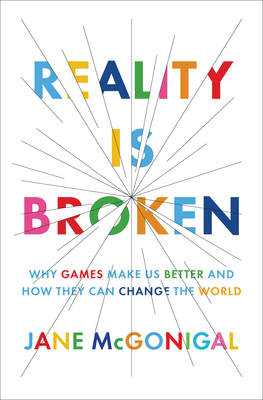

Remember books? Sure you do! Author Jane McGonigal has provided gamers with a new weapon for fighting the good fight. "What's the good fight?" you ask. Why, proving to our significant others, bosses, parents, children, or pets, that what we do in front of the flashing screen is important...not just for us, but for the whole world! In her book "Reality is Broken," McGonigal explores how games help gamers develop problem solving techniques that can be applied to real world problems. She recently sat down with Kai Ryssdal for a radio interview, and had this to say about gaming and reality:
JANE MCGONIGAL: What seems to me to be totally broken about reality is the difference between how we feel when we're playing our favorite games and how we feel in real life. When we're playing our favorite games, we feel like we are on a journey. We have a heroic purpose and we are ready to rise to the occasion. And in our real lives, we just don't have the sense that we can do something that matters, that we can have that impact, that we have the collaborators. And I'm really just looking for ways to take that incredible structure of games -- that put us on the path to save the world -- and bring it into the real world.
Ryssdal seems a bit skeptical, and lets McGonical know it:
RYSSDSAL: Let me try to pin you down a little bit. We are spending these hours -- these tens of thousands of hours, gamers are -- in these games, developing all these skills. But what are they really good at? I mean, what can gamers do?
McGonical with the co-op counter!
JM: ...one that is really important is this idea of extreme-scale collaboration. Now, increasingly, people are spending time playing multi-player and massively multi-player games. And when you do that you start to develop what I call "collaboration radar." You're always looking out for what other people are good at, what their strengths are, what they can bring to the team. And that ability to organize large groups of people, where everybody gets to contribute their skills, their strength, is really important as we start to tackle planetary-scale problems. We're going to need a lot of people and we're going to need to find something for everyone to do.
"Collaboration radar." I like the sound of that. Let's try it out.
"Hey everyone, according to my 'collaboration radar', I think Player Two should watch my back, and Player Three should manage party health, while I, Player one, team up with Player Four for a frontal assault."
That seems to be more eloquent than, "You suck, stay behind me," or "Is anybody healing anybody?!" or "Has anyone even seen 'EPICLY AWSOme' since the game started?"
To read or listen to the full interview, you can head over to American Public Media. The more coverage games get as an art form or a learning tool, the better they get,. If intellectual conversations about real life merits of video games pique you interest, you can support Co-Optimus and pick up "Reality is Broken" with this Amazon.com link. It might make a great gift for your folks. When they open it you can scream, "See Mom and Dad, I'm not just head-shotting zombies, I'm saving the frick'n world!" Then you can go back to your 156th consecutive hour of "Zombies" in Call of Duty: Black Ops.
Thanks for the tip, KG!